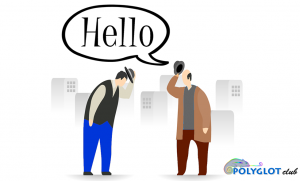Difference between revisions of "Language/Lamnso/Vocabulary/How-to-Say-Hello-and-Greetings"
< Language | Lamnso | Vocabulary
Jump to navigation
Jump to search
m (Quick edit) |
m (Quick edit) |
||
| Line 73: | Line 73: | ||
*More information on her website: http://users.elite.net/runner/jennifers/ | *More information on her website: http://users.elite.net/runner/jennifers/ | ||
==Free | ==Free Lamnso' Lessons== | ||
*'''[[Language/Lamnso/Grammar|Grammar Lessons]]''' | *'''[[Language/Lamnso/Grammar|Grammar Lessons]]''' | ||
Revision as of 21:25, 3 September 2021
🤗 Lamnso' Greetings for Everyday Life
Hi Lamnso' learners! 😃
Do you want to learn how to say “Hello” in Lamnso'?
Greetings are an important part of any language because they allow you to connect and communicate with others.
If you’re planning a trip to the country or are trying to learn Lamnso', keep reading to discover some of the most important greetings.
Let’s get started! 🤗
Greetings
| English | Lamnso' |
|---|---|
| morning greeting | Ira nia |
| morning greeting, "is it clear?" | Yirane a? |
| reply to Yirane a | R eeno |
| afternoon greeting | Aresi nia |
| evening greeting | E ginia |
| how are you? (literally "what news?") | Asaka? |
| reply to Asaka (literally "no news") | Saka yo dzə |
| reply to Asaka (literally "I'm fine") | M bo sa |
| how are you? | Kidze le? |
| welcome greeting | Wikijum |
Sources
Polyglot Club thanks Jennifer Runner for her outstanding work in collecting some of the phrases for this Lamnso' lesson. 👍
Her objective is, like the Polyglot Club, to promote intercultural communication and understanding and to raise awareness of linguistic diversity in the world. ✨
- More information on her website: http://users.elite.net/runner/jennifers/
